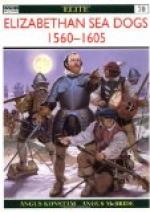Henry’s maritime rivals were the two greatest monarchs of continental Europe, Francis I of France and Charles V of Spain. Henry, Francis, and Charles were all young, all ambitious, and all exceedingly capable men. Henry had the fewest subjects, Charles by far the most. Francis had a compact kingdom well situated for a great European land power. Henry had one equally well situated for a great European sea power. Charles ruled vast dominions scattered over both the New World and the Old. The destinies of mankind turned mostly on the rivalry between these three protagonists and their successors.
Charles V was heir to several crowns. He ruled Spain, the Netherlands, the Kingdom of the Two Sicilies, and important principalities in northern Italy. He was elected Emperor of Germany. He owned enormous oversea dominions in Africa; and the two Americas soon became New Spain. He governed each part of his European dominions by a different title and under a different constitution. He had no fixed imperial capital, but moved about from place to place, a legitimate sovereign everywhere and, for the most part, a popular one as well. It was his son Philip II who, failing of election as Emperor, lived only in Spain, concentrated the machinery of government in Madrid, and became so unpopular elsewhere. Charles had been brought up in Flanders; he was genial in the Flemish way; and he understood his various states in the Netherlands, which furnished him with one of his main sources of revenue. Another and much larger source of revenue poured in its wealth to him later on, in rapidly increasing volume, from North and South America.
Charles had inherited a long and bitter feud with France about the Burgundian dominions on the French side of the Rhine and about domains in Italy; besides which there were many points of violent rivalry between things French and Spanish. England also had hereditary feuds with France, which had come down from the Hundred Years’ War, and which had ended in her almost final expulsion from France less than a century before. Scotland, nursing old feuds against England and always afraid of absorption, naturally sided with France. Portugal, small and open to Spanish invasion by land, was more or less bound to please Spain.
During the many campaigns between Francis and Charles the English Channel swarmed with men-of-war, privateers, and downright pirates. Sometimes England took a hand officially against France. But, even when England was not officially at war, many Englishmen were privateers and not a few were pirates. Never was there a better training school of fighting seamanship than in and around the Narrow Seas. It was a continual struggle for an existence in which only the fittest survived. Quickness was essential. Consequently vessels that could not increase their speed were soon cleared off the sea.




